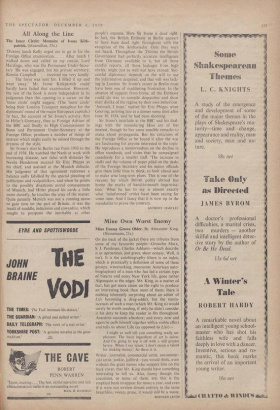All Along the Line
`DURING lunch Kelly urged me to go in for. the Foreign Office examination. . . . After lunch 1 walked down and called on my cousin, Lord Hardinge, who was the Permanent Under-Secte- tary He was engaged, but his private secretary, Ronnie Campbell . . . received me very kindly. . . The form was sent for. I filled it up and went away.' Mr. Ivone Kirkpatrick could hardly have failed that examination. However, the rest of the book is more independent in its judgments than this opening to a career on the 'inner circle' might suggest. (The 'inner circle' being their London Transport metaphor for the diplomats' round of the major European capitals.) In fact, the account of Sir lvone's activity, first in Hitler's Germany, then as Foreign Adviser of the BBC and finally as High Commissioner in Bonn and Permanent Under-Secretary at the Foreign Office, produces a number of things of interest which might easily be missed through the dryness of the style.
Sir Ivone's stint in Berlin ran from 1933 to the end of 1938. He watched the Nazis at work with increasing distaste, saw (also with distaste) Sir Nevile Henderson succeed Sir Eric Phipps as his chief, and assisted at the Munich debacle. His judgment of that agreement redresses a balance sadly falsified by the special pleading of politicians and realpolitikers, and when he points to the possibly disastrous moral consequences of Munich, had Hitler played his cards a little more cleverly, he touches the crux of the matter. Quite patently Munich was not a cunning move to gain time on the part of Britain; it was the result of muddle, indecision and cowardice, which sought to postpone the inevitable at other
people's expense. Here Sir Ivone is dead right. in fact, the British Embassy in Berlin appears to have been dead right throughout with the exception of the Ambassador. Only they were not heard. Throughout the Thirties the British Government had perfectly accurate intelligence from Germany available to it, but all those careful reports, all those leakages from high circles, might just as well not have existed. Suc- cessful diplomacy depends on the will to use the information acquired, and that will was lack- ing in London. Sir Ivone's career in Berlin must have been one of maddening frustration. In the absence of support from home, all the Embassy could do was to compile despatches and show their dislike of the regime by their own behaviour. 'Animals, I hope,' replied Sir Eric Phipps when Goering, arriving late at a dinner some time after June 30, 1934, said he had been shooting.
Sir Ivone's interlude at the BBC and his deal- ings with the maundering Hess are of less interest, though he has some sensible remarks to make about propaganda. But his criticisms of the Foreign Office as he found it after the war are fascinating for anyone interested in the topic. He reproduces a memorandum an the decline in office standards, and states that he campaigned ceaselessly for a smaller staff. 'The increase in staffs and the volume of paper piled on the desks of the Foreign Secretary and his senior officials give them little time to think, to look ahead and to make wise long-term plans. This is one of the reasons for which British policy abroad has borne the marks of hand-to-mouth improvisa- tion.' What he has to say is almost exactly what 'uninformed' critics have been saying for some time. And I fancy that it is now up to the mandarins to prove the contrary.
ANTHONY HARTLEY














































 Previous page
Previous page